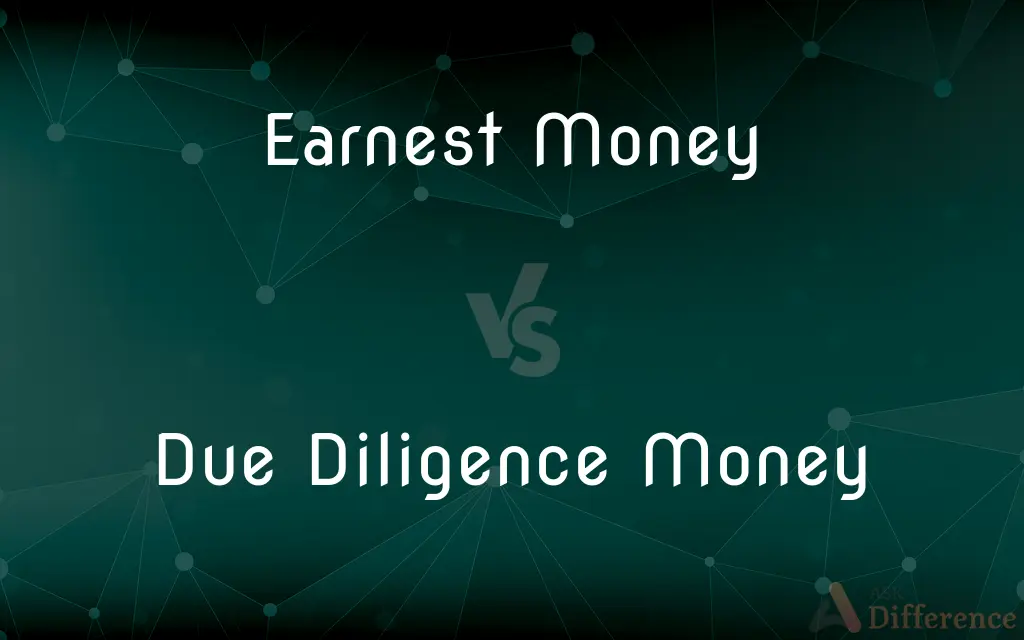Earnest Money vs. Due Diligence Money — What's the Difference?
Edited by Tayyaba Rehman — By Maham Liaqat — Published on November 30, 2024
Earnest money is a deposit showing a buyer's good faith in a real estate transaction, while due diligence money compensates the seller for the buyer's opportunity to conduct property inspections and assessments.

Difference Between Earnest Money and Due Diligence Money
Table of Contents
ADVERTISEMENT
Key Differences
Earnest money is a security deposit made by a buyer to demonstrate commitment to the purchase agreement. It's often held in an escrow account and applied toward the purchase at closing. Due diligence money, alternatively, is paid directly to the seller as compensation for the buyer's exclusive right to evaluate the property, typically non-refundable and not always credited toward the purchase price.
Earnest money protects the seller from a buyer's default, serving as a financial assurance that the buyer is serious. If the buyer backs out without a valid reason, the seller may keep the earnest money. Due diligence money, however, gives the buyer a specified period to conduct thorough inspections and assessments of the property, with the option to walk away from the deal for any reason.
The amount of earnest money varies but is generally a small percentage of the purchase price, showcasing the buyer’s intent to proceed with the transaction. In contrast, due diligence money is often a smaller, negotiated amount that reflects the buyer's immediate investment in the property's evaluation process.
Earnest money is part of the broader real estate contract and is applicable in many real estate markets, due diligence money is a concept that might not be present in all jurisdictions. Its use and the terms surrounding it can vary significantly based on local real estate practices.
The handling of these funds upon the termination of a real estate deal also differs. Earnest money may be returned to the buyer or kept by the seller based on the contract terms and the reason for the deal's failure. Due diligence money, being non-refundable, is typically retained by the seller regardless of whether the purchase is completed.
ADVERTISEMENT
Comparison Chart
Purpose
Shows buyer’s commitment to the transaction.
Compensates seller for buyer’s evaluation period.
Refundability
Often refundable if the deal falls through under contract conditions.
Generally non-refundable, paid for the right to inspect.
Paid To
Held in an escrow account until closing.
Paid directly to the seller.
Application
Applied toward purchase at closing.
May not be credited toward the purchase price.
Typical Use
Common in many real estate transactions.
Usage and acceptance vary by location and agreement.
Compare with Definitions
Earnest Money
Often refundable under specific contract conditions.
The earnest money was refunded when the buyers failed the financing contingency.
Due Diligence Money
Not always applied to the purchase price.
The due diligence money went directly to the seller as compensation for taking the property off the market.
Earnest Money
Held in escrow until the deal closes.
The earnest money will remain in the escrow account until closing day.
Due Diligence Money
Paid to the seller for the right to conduct property evaluations.
The buyer paid $1,000 in due diligence money for a 30-day inspection period.
Earnest Money
Demonstrates financial commitment.
Offering a larger earnest money deposit can make a buyer’s offer more attractive.
Due Diligence Money
Provides buyers a period to assess the property thoroughly.
During the due diligence period, the buyer discovered foundation issues.
Earnest Money
A deposit showing the buyer's intention to complete a real estate transaction.
The buyers submitted $5,000 in earnest money to secure their offer on the house.
Due Diligence Money
Reflects the buyer’s seriousness about proceeding.
By paying due diligence money, the buyer showed genuine interest in finalizing the purchase.
Earnest Money
Applied to the purchase price at closing.
At closing, the earnest money was credited toward the buyer's down payment.
Due Diligence Money
Non-refundable, emphasizing buyer's immediate investment.
The due diligence money was not returned when the buyer backed out.
Earnest Money
Alternative form of earnest money
Common Curiosities
What is due diligence money?
Due diligence money is a payment made to the seller for the buyer's right to inspect and evaluate the property.
Is earnest money refundable?
Earnest money can be refundable if the deal falls through due to contingencies outlined in the contract.
What is earnest money?
Earnest money is a deposit made by a buyer to show commitment to a real estate transaction.
How much due diligence money is typical?
Due diligence money amounts can vary greatly and are often a matter of negotiation between the buyer and seller, reflecting the time needed for inspections and the buyer's seriousness.
Why pay due diligence money?
Due diligence money compensates the seller for the buyer's opportunity to conduct thorough property evaluations and potentially back out of the deal.
How is earnest money used?
Earnest money is typically applied toward the purchase price of the property at closing.
How do earnest money and due diligence money benefit the seller?
Earnest money provides the seller with financial assurance that the buyer is serious, potentially compensating for market removal if the deal falls through. Due diligence money compensates the seller for the buyer's exclusive right to evaluate the property, ensuring the seller is compensated for their time and the opportunity cost of not marketing the property during this period.
What happens to earnest money if the deal falls through?
If a deal falls through due to a contingency clause being activated (like failing to secure financing), the earnest money is usually returned to the buyer. Otherwise, it may be forfeited to the seller.
What happens to due diligence money if I decide not to buy the property?
Due diligence money is generally non-refundable, so if you decide not to proceed with the purchase, the seller keeps this money.
Can due diligence money be applied to the purchase price?
It depends on the agreement,
How much earnest money should I offer?
The amount of earnest money varies but is typically 1-3% of the purchase price, depending on the market conditions and local customs.
Is due diligence money a common practice in all states?
The practice of paying due diligence money varies by region and is not common in all states. It's more prevalent in certain markets where the real estate process includes a due diligence period.
How do I protect my earnest money?
To protect your earnest money, ensure your purchase agreement includes contingencies for financing, home inspection, and appraisal that allow you to back out if necessary conditions are not met.
Can earnest money be lost?
Yes, earnest money can be lost if the buyer backs out of a deal without a contractually specified reason or fails to follow through on the purchase agreement terms.
Are there any risks to paying due diligence money?
The primary risk of paying due diligence money is that it is non-refundable, meaning you will not get it back if you decide not to proceed with the purchase, regardless of the inspection outcomes.
Share Your Discovery

Previous Comparison
Access Point vs. Extender
Next Comparison
Confederate Constitution vs. Union ConstitutionAuthor Spotlight
Written by
Maham LiaqatEdited by
Tayyaba RehmanTayyaba Rehman is a distinguished writer, currently serving as a primary contributor to askdifference.com. As a researcher in semantics and etymology, Tayyaba's passion for the complexity of languages and their distinctions has found a perfect home on the platform. Tayyaba delves into the intricacies of language, distinguishing between commonly confused words and phrases, thereby providing clarity for readers worldwide.













































